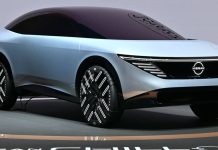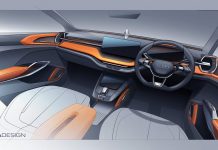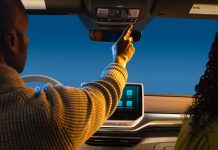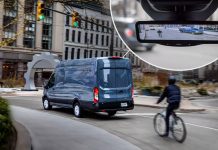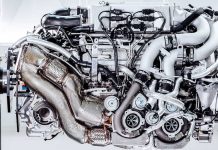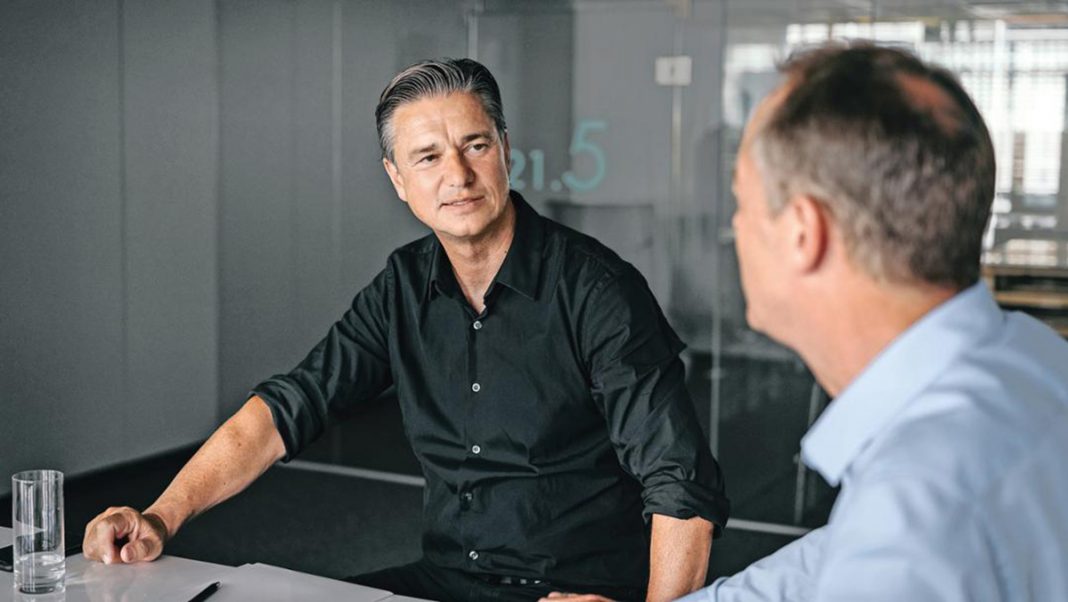Lutz Meschke, Deputy Chairman of the Executive Board and Member of the Executive Board—Finance and IT of Porsche AG, and Dirk Lappe, Managing Director Porsche Engineering, met to talk about how digitalization and new technologies such as artificial intelligence (AI) affect Porsche and the automotive industry.
Mr. Meschke, in an earlier interview you quoted from a movie by Italian director Luchino Visconti: “If we want things to stay as they are, things will have to change.” Can you explain this contradiction to us: how will technologies classed as disruptive—digitalization and artificial intelligence—make it possible to keep everything the way it is?
Lutz Meschke: What I meant was this: the Porsche brand produces remarkable inertia, and we are highly successful in terms of revenue. But if we want to make sure that both of these are still that way in five years’ time, we need to use all the options we have now to position Porsche for the future. Especially with respect to digitalization and AI. We’ll only reach our goals if we use these technologies to devise new products and services. On top of that, we need to completely re-orient all of our corporate processes and manage a shift in mentality. Which, by the way, not only Porsche needs to do but all of the automotive industry.
How far has Porsche been able to shift its mentality so far?
Meschke: In some ways, we’re quite far already. But the point is that we need to get everyone at Porsche on board. Sure, some people are worried about the changes digitalization brings with it and see their jobs in jeopardy. But we need to understand that the new technologies are opportunities, not risks. We have to be prepared to learn and develop. It’s the only way for everybody to actively engage in taking the company forward.
Mr. Lappe, what is Porsche Engineering’s role in digitalization?
Dirk Lappe: We want to be part of the front line in the digitalization of our customers. It’s really important to me that we don’t simply deliver run-of-the-mill solutions but that our designs actually add value. Which is why we love working with artificial intelligence and digitalization, because these technologies massively add value for our customers.
But digitalization and AI are still new fields for a service provider who comes from classic vehicle design. How are you feeling the changes?
Lappe: The rate of change has increased dramatically and we’re experiencing more and more sudden events that require matching solutions for our customers. For example, software development has now become a major item with us, because it’s turning more and more into a USP. It’s already leading to increased customer inquiries today.
Meschke: It’s really important to us that Porsche Engineering be successful in the market. Porsche Engineering is where the entire group began. Porsche started off by offering development services for customers before designing and producing any sports cars of our own. So, Porsche Engineering is obviously really important to us. They have lots of customers from all over the automotive trade, everywhere in the world, and I think that their position will only become more pivotal as digitalization progresses, not only for us, but throughout the whole market.
“We need to completely re-orient all of our corporate processes and manage a shift in mentality.”
Lutz Meschke
What role does an engineering services company like Porsche Engineering play in this phase of digitalization?
Meschke: An engineering services provider always needs to know where events are leading—at a global scale, even. Especially in terms of internationalization, Porsche Engineering has made excellent progress over the last few years, for example by setting up sites in Prague, and in Cluj in Romania. We’ve been able to take on lots of great new people who really want to work with us long-term. Porsche Engineering at the innovation site Cluj: to me, that’s a real story of success.
Lappe: Our activities in Shanghai also play a key role. We’ve become a sort of gateway into China. You know, these days nobody believes in the world car anymore. For China, an automobile manufacturer needs different software from that in the same model supplied in the US or Europe. Which makes maintaining a permanent site in China really important for a vehicle developer.
Mr. Meschke, you’re not only in charge of IT and digitalization at Porsche AG, you’re head of finance, too. Doesn’t it vex you that digitalization is pretty expensive?
Meschke: In the past, IT was a cost issue. Everyone knew you needed IT, but everyone wanted it at budget price. It’s not like that anymore: today, we view IT and digitalization as competitive strengths. If I don’t make the cut with the big players, I’m losing out to my competitors. We’ll never be selling the same number of cars if we don’t offer the full connectivity package. In China, our customers are very young. They want to be able to use all the features their smartphones offer in their cars, too. And they expect additional digital services in the car on top of that. So we have no choice but to invest heavily.
Lappe: And investing in IT doesn’t only improve your competitiveness, it also cuts costs. Take a look at prototype construction in vehicle development, for example. We used to build a whole lot of vehicles. Today, we use digital tools to build a virtual vehicle. We save on building a large number of prototypes; that’s a lot of money saved. The digital world offers lots of options for improving efficiency like that.
How much are you investing in digitalization?
Meschke: For all of the corporate processes, smart factory, interfaces with customers, products and services, all that, we’re investing more than 800 million euros a year. We’re also budgeting more than 150 million a year for investing in start-ups and venture capital businesses. So we’re looking at almost one billion euros all together. We have a budget of over two billion euros for conventional vehicle development. So you can see how significant digitalization has become. And it’ll only get more important in future.
“Investing in IT doesn’t only improve your competitiveness, it also cuts costs, for example by using virtual prototyping.”
Dirk Lappe
What role does Porsche play in Volkswagen Group’s digitalization process?
Meschke: As a premium brand manufacturer, we’re naturally looking at different challenges from those of mass-market manufacturers. We need to engage with the relevant tech players to offer our customers the solutions they’re looking for. The partners themselves are different depending on the region we’re talking about. But in terms of an electronics platform, standardizing across the entire group makes sense to enable us to benefit from economies of scale. Digitalization also makes it necessary for us to focus the capacities within the group because we need to meet a vast scope of development requirements in the new fields.
Lappe: Porsche will be using more and more modules and platforms supplied by the group. But we still need to make sure that a Porsche stays a Porsche—and digitalization can help us do so. This is where Porsche Engineering will act as a driver to push brand-specific developments. The experience we gain in software development for sports cars will benefit our other customers, too—the same as with all of our other engineering activities.
About
Lutz Meschke graduated in business administration. He left Hugo Boss to join Porsche AG in 2001. He has been a member of the Executive Board since 2009, where he is in charge of Finance and IT. In 2015, Lutz Meschke took on the post of Deputy Chairman of the Executive Board with the sports car company.
Dirk Lappe graduated in electrical engineering. He joined Porsche Engineering in 2002, where he started off as head of the electrics/electronics division. He has been Managing Director at Porsche Engineering since 2009. Dirk Lappe previously worked for Bosch and Harman Becker.









